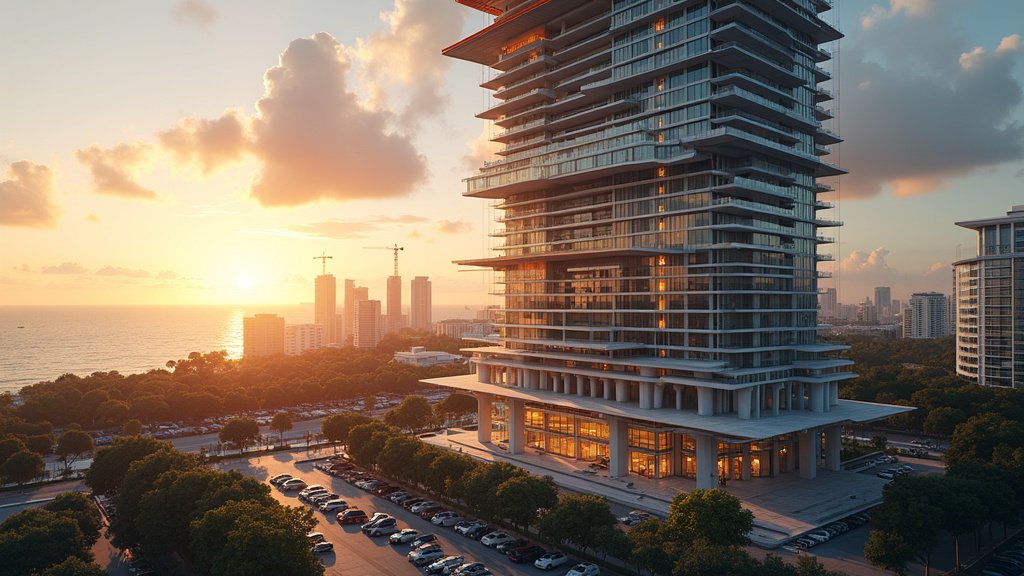In a move that has quickly become major news, Florida officials have approved the gifting of a prime 2.6-acre parcel of public land in downtown Miami for the construction of the Donald J. Trump Presidential Library. The decision, made by Governor Ron DeSantis and the Florida Cabinet on September 30, 2025, has ignited both excitement for a new landmark and controversy over the process and location.
A Prime Miami Location Secured
The 2.6-acre site, currently functioning as an employee parking lot for Miami Dade College’s (MDC) Wolfson Campus, is situated in a highly desirable downtown Miami location adjacent to the historic Freedom Tower on Biscayne Boulevard. This valuable piece of real estate has an appraised value of approximately $67 million, according to county property records. However, real estate developers familiar with the area estimate its market value could range between $200 million and $300 million, highlighting the significant value of the land being transferred. For decades, this parcel was the subject of development proposals that ultimately failed, with previous attempts by other developers to secure the land unsuccessful. The Trump Presidential Library Foundation, however, acquired it for free.
The Vision for a Landmark Library
Eric Trump, a trustee for the Donald J. Trump Presidential Library Foundation, announced that the planned library will be a striking high-rise tower, envisioned as a “bold landmark on Miami’s skyline” and “visible for miles into the Atlantic.” This ambitious design aims to create an iconic structure that reflects the achievements of the 45th and 47th President. Beyond the archival and museum functions, there have been discussions about incorporating a hotel component, a departure from the traditional model of presidential libraries and a move that could transform the site into a mixed-use destination. Trump’s son has proclaimed it will be “the greatest Presidential Library ever built.”
How the Land Deal Unfolded
The transfer of the land was spearheaded by Governor Ron DeSantis and the Florida Cabinet, who voted unanimously to convey the property. The process, however, has been criticized for its lack of transparency. Miami Dade College’s Board of Trustees voted to transfer the land to the state just days prior to the Cabinet’s decision, with reports indicating that board members received minimal information about the intended use of the property and that the meeting was not publicly broadcast. Governor DeSantis’ office had requested the transfer with limited details provided to the college. Despite these criticisms, the Cabinet’s vote to gift the land was unanimous, with members expressing strong support for housing the library in Florida.
Key Figures and Foundation
The Donald J. Trump Presidential Library Foundation is the entity set to develop the library. Its board of trustees includes Eric Trump, Michael Boulos (husband of Tiffany Trump), and Trump attorney James Kiley. Governor DeSantis has been a vocal proponent, stating that Florida has advanced President Trump’s agenda more than any other state and would be honored to host his library. Attorney General James Uthmeier also voiced his support, anticipating the library would showcase patriotic stories for generations to come. Eric Trump expressed pride in the Florida officials for their role in facilitating the endeavor.
Symbolism and Controversy
The chosen location adjacent to the Freedom Tower, a building historically recognized as the “Ellis Island of the South” for processing Cuban refugees, has become a focal point of controversy. Critics, including former MDC President Eduardo J. Padrón and civil rights activist Dr. Marvin Dunn, argue that placing a library honoring a president whose immigration policies have been controversial next to such a potent symbol of freedom and refuge is deeply problematic and an “insult to immigrants.” They contend the land should have been prioritized for the college’s expansion and students. Conversely, supporters suggest the location is fitting, aligning with Trump’s appeal among Cuban-American voters in Miami. This news has sparked protests from those who feel the decision was made without sufficient public input and disregards the land’s original purpose.
Legal Framework and Future Conditions
Governor DeSantis signed legislation earlier in 2025 that aims to prevent local governments from imposing restrictions on the development of presidential libraries, consolidating authority at the state level. This measure was intended to preempt potential opposition from local authorities. The agreement for the land transfer stipulates that construction of a “Presidential library, museum, and/or center” must commence within five years. The land itself represents a significant asset, with its strategic location and development potential.
Conclusion
The approval of the land for the Donald J. Trump Presidential Library marks a significant development in Miami’s evolving skyline and political landscape. While proponents tout economic benefits and a new landmark, critics raise concerns about transparency, public process, and symbolic appropriateness. As the project moves forward, it is poised to be Florida’s first presidential library and will undoubtedly remain a trending topic of discussion and debate in Miami and beyond.





